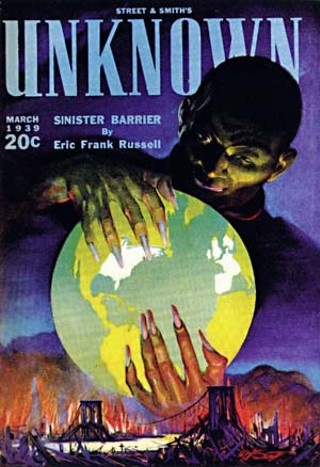Page Two: Nightmares on Main Street
New media, same old story
By Louis Black, Fri., Sept. 17, 2010

What it comes to be about, more than anything else, is perseverance. Edison said that genius was 1% inspiration and 99% perspiration. While tacking nowhere near claims of genius, and with perhaps only the thinnest assertion of inspiration, I usually find that what counts is to keep on keeping on – no matter how many people try to barricade your way with doubt or mockery or contempt. From early on, I not only embraced my stupidity but insisted on my right to it.
Living through such intense times of overamped stridency, one can buy into the ever swifter tornado clouds of cataclysm: end of days, death of the republic, failure of America, economic doom, hordes of illegal immigrants, vast armies of those not us, conspiracy theories, kudzu corruption, and immortality sweeping over the political landscape as a plague – aggressively anti-American, anti-"us" ideologies, coupled with the contemptible, cowardly, ignorant, self-hating, and destructive fantasists within.
It is a time that is either truly and profoundly apocalyptically prevolcanic, readying for a once-in-world-history eruption, or else it's just a very fevered montage of bad dreams, jumbled jargon, and hysteria over uncertainty (as life is always uncertain), combined with the most enormous hangover of every real, imagined, fictional, biblical, prophesied, hallucinated misstep in history. It's as if every level even hinted at was not only real but is now here and poised, every enemy more powerful than as described in the most fantastic exaggeration – and that there are some among us who nurture the most profound human weaknesses and deepest moral failings as though they are not just admirable but the purest virtues to be striven toward.
Media is explosive, evolving at a rate that keeps picking up speed until just saying how it has changed dates the speaker, indicating he or she is not exactly on top of the latest generation of innovation.
In so many ways, though, media is now rarely tangible (instead of movies, newspapers, magazines, telegraph messages, written letters, handbills, etc., it is lightning through the air; it is unseen, arriving as soon as it is sent). I am still an unevolved child of Gutenberg, one to whom print still shimmers so intensely as to prescribe the boundaries of how I learn and communicate. I'm really not even of Edison, Marconi, and Bell, although my distance from them is not as great as from Einstein, IBM, Hewlett-Packard, etc.
But, though a child of words who lives in a world defined by words, I would never argue that the universe is so circumscribed. Words were a way of communicating ideas devised by the Sumerians, Egyptians, and Chinese, among others. Words are not holy unto themselves; reading is not sacrosanct. Written language as we know it serves communication and ideas, but it is not the only, or the highest, form of either of those. My limits should be not projected outward but respected as my boundaries.
Still, for all the hoopla of the new and despite the ever-shrinking world, with its population growing ever more together (not spinning apart), sometimes the problem is in the very ideas being communicated. No matter how sophisticated communication becomes, hardware never endows software with greater resonance and meaning.
Such is a time of world media, of speed-of-light transmissions, of near-invisible but constant, comprehensive global communication. Too often I feel as though, as far as humanity has progressed, it hasn't really moved that much at all. The aura, hysteria, odd emphatic tone, and tensile mosaic communicated in this most modern of worlds seem not terribly different from those of photos on a newsstand from the Thirties or Forties, featuring a racked display of brilliantly colored pulp magazine covers, some iconic and generically definitive, others garish and racy.
The difference is that those endless stories of worlds crashing, major cities exploding, foreign armies invading our shores, twisted creatures haunting the night, civilizations failing, and technology often run amok were acknowledged fictions. Now, too often, many or most of us insist that these are of truth and reality, not the imagination.
The covers of these pulps featured spaceships, robots, women sometimes tortured (and sometimes torturing, though often half-clothed regardless), evil Asian warlords, strange gigantic monsters, malevolent skeletons, planes, thugs, ghosts, zombies, sheiks, pirates, quarterbacks, terrifying aliens, cowboys, and detectives as well as both men and women raised in the jungle by wild animals. They were advertising the stories inside: The Spider with its cover story "Slaves of the Laughing Death," Thrilling Mystery featuring "City of Dreadful Night," Startling Stories with the wonderfully titled "The Gods Hate Kansas," Dime Mystery Magazine's "The Werewolf of Wall Street," and Spicy Mystery Stories' "I Must Have 5 Corpses!."
But what was once fantastic is now regarded as real; ideas once considered delusional nightmares are now accepted as real politics. There is nothing so outrageous or exaggerated that it will universally be dismissed if someone says or prints it. More and more, the declaration, no matter how absurd, has become documentation. The assertion, just by being made, is the same as near-complete truth.
It has been a crazy time, with travel, family, and moving all piling up. I was in London about a week ago. I watched a lot of television news. One of the things that was unavoidable was noticing that, in London, the news on al Jazeera is so much less polemical and ideologically constricted than it is on the Fox network. This is not because the reporters and anchors were saying things more to my liking or that I felt more in sympathy with the network's politics than with Fox's. Nor was I watching it academically, day and night, taking detailed notes. It's just that the times I watched it, the reporting was consistently much less ideologically crafted propaganda and far more fair and balanced than almost anything seen on Fox.
Again, I watched no special Mideast report or talk shows, so I'm not trying to make any universal claim. But the differences between the two networks were so pronounced as to be unavoidable. Which is what led me to do all this thinking about pulp magazines.








